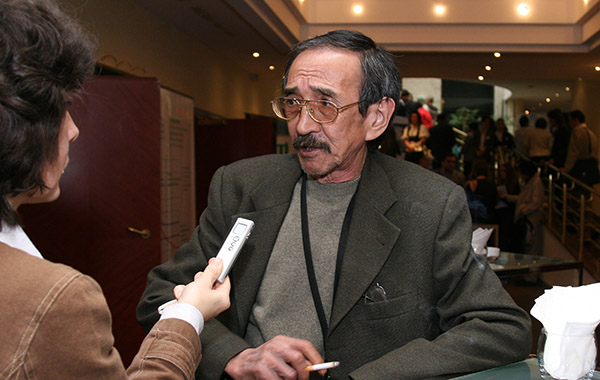Kazakhstani president’s order to move Kazakh language to Latin script by 2025, that was voiced in his article, “Bolashkka bagdar: ruhani jangyruu” (A look into the future: modernization of public consciousness) published on April 12 in the newspaper Egmen Kazakhstan, has cause loud disputes in the society.
Let’s examine the arguments of those who are pro and those who are against.
Let us start by saying that the idea itself isn’t new. The process of Latinization of writings of people of USSR has started at the dawn of Soviet times, interestingly from the idea of translating Russian alphabet into latin.
“In 1919 newspaper Izvestiya wrote: Now we need to conduct another reform in the interest of Russian enlightenment and replace Russian script with Latin. Our alphabet is too complicated and is so different from the one accepted in western Europe that it terrifies foreigners. We need to switch to Latin script which is easier and smoother, in the same way we switched from Russian calendar to the European one, as well as switching to the metric system from puds and arshins”. – Dastan Kadyrjanov reminded in the interview to newspaper Vremya.
The argument that Latin script is easier to comprehend prevails right now. For example, for IT specialists a switch to latin script is a godsend. For example, IT specialist Gani Mirzamuratov reminds that “many databases and software don’t support Kazakh letters… and you cant even use them to search for things”. He also reminded that Cyrillic letters take up twice as much space in the memory. “For example, if latin letter A takes up 1 bite, then letter A in Cyrillic will take 2 bites”.
Political expert Kuat Dombay sees advantages of Latin script for Kazakh language not only in phonetics, but also in logistics: “To search for 44 letters on a cell phone and on the keyboard is a struggle”.
Head of the Institute of regional problems D. Juravlev, in the commentary to Kazinform noted that the advantage from switching to Latin script will be not in the easy learning of Latin languages due to common Latin graphics, but in the strengthening of Turkic linguistic unity. It is a very serious impulse”.
Cultural expert Murat Auezov thinks that “Latin scripture will give us an opportunity to consolidate, without this, it is very hard for Turkic people to exist in the modern world. Right now, unfortunately we cannot read literature of people, close to us linguistically. In turn, they cannot read our literature”.

At the same time Auezov warns not to view linguistic reform through geopolitical prism: “Reform of Kazakh scripture doesn’t mean a complete denial of the cyrillic, since our society has to know Russian language and Russian culture really well, and denying them will be a huge loss for us. We have to admit that the prospects of development of our country are related to being tri-lingual; it is a fact that we sometimes understand, but sometimes also start to forget”.
Among supporters of switching to Latin script is also political expert Aydos Sarim, who rallies for reform of Kazakh alphabet and supposes an existence of political consequences of such a step: Political consequences will undoubtedly follow. And I hope that they will be positive ones. What I mean is that a new generation free of Soviet past will come in, and this generation will leave the Soviet colonial discourse. What did Soviet regime do in its time? It moved Kazakh scripture into Cyrillic and in essence torn people off from their own past. What is happening now is a similar process, and I think there is no need to say “let’s not politicize this” because this is a priori a political move.
Finally, in political expert Erlan Karin’s opinion a move towards a new alphabet will allow for strengthening of media borders; He is convinced that Kazakhstan has an advantage before the countries that switched to Latin script earlier: “Relying on a positive and sometimes erroneous experience of former Soviet republics, Kazakhstan can account for mistakes figure out the project before 2025, with its set of technical, industrial and other issues.”

At the same time, Karin is convinced that changing the alphabet doesn’t contradict integrational processes of Kazakhstan: “President said that we are aimed at developing economic cooperation, forming Eurasian economic space, but we are talking specifically about economic parameters pf integration, rather than political forms. Thus an idea of introducing of latin alphabet doesn’t contradict our integrational processes.”
At the same time opponents of moving towards a Latin script call this decision an absurd idea. A while back, famous Kazakh economist Kanat Berentaev in the interview to Vremya newspaper warned that it might lead to a “ complete loss of generational connection”: “We will lose everything we have, and won’t gain anything new. Facilitating a move towards Latin script is an absurd idea – we simply don’t have that opportunity. Imagine having to translate all of Kazakhstani classics, works of Abay, Saken Saifullin Muktar Aezov and others into Latin script. Who will take on that task and will there be readers?”

He said that in 1993-1994 he was in Tashkent right at the time when Uzbekistan was moving towards a Latin script. “When we discussed investments into education, it turned out that expenses in Uzbekistan are two-three times higher than in Kazakhstan. I then visited first deputy head of Gozprognozstate (government forecast and stats agency) of Uzbekistan and asked him about it, and he said that out of these expenses towards education, nearly 70% went towards translating textbooks to Latin script”.
In Berentaev’s opinion this process in Kazakhstan will be linked not only to massive expenses, but also with serious negative consequences: “Until this moment nobody calculated the sum that will be required to move Kazakh alphabet into Latin script. However, all experts are unanimous in their opinion that it won’t be cheap. We could say that it will take millions or billions but the real price is much higher – the loss of Kazakh identity, which is a much higher price”.
Kazakhstani writer K. Kabdrahmanov is also unhappy with that decision. In his words this reform is meaningless in terms of language, and its purpose is far from linguistic one.

The purpose before our case were always political. In the thirties, when Soviet powers had moved Kazakh language into Latin script in the matter of days, the purpose was to disconnect Kazakh culture form islamist influence. When in the 1920s in the same fashion translated their language into Latin script, the goal was to disassociate themselves from the heritage of Ottoman Empire. If we continue this logic we will see then that the goal of planned move of Kazakh alphabet into Latin script is a denunciation from Soviet culture and distancing from Russian one. We need to speak directly about it.
But it is impossible to cut ties with Russian culture. Because it became an organic part of modern Kazakh culture. What cultural influence does Uzbekistan, Turkmenistan or Kyrgyzstan have on us? None – even a slightly more advanced Turkey is a zero in terms of cultural influence. There are thousands of books written in Cyrillic that were published in millions. Generations of Kazakhs born under Latin script will treat these books as disposed material – not only pulp fiction will go to waste but also good books”.
Nurlan Terekanov has left an emotional comment on facebook.

“Kazakh’s excitement over upcoming Latin script is very similar to excitement over moving into slums with no bathroom – let it be bad, but at least its ours! They can partially be understood. They got tired of sitting under Russian iron boot – is that what its called? Because they were under Tataro-Mongol rule, for how long? 300 years? And how long were we under theirs – is it also 300 years soon? See math wins.
We can’t wait to have something of our own, I understand. But here’s what I want to say: a break between leading world powers is growing with catastrophic speed! A catastrophic speed! Can you name at least one thing Kazakhs gave the world in the past hundred years? Just one, I beg you! If yesterday there were 40 years dividing us, today its 60 and tomorrow even without a transfer to latin script and loss of our weak knowledge base it will be 80. And with losing it it will be 180.
If you aren’t a fool, I don’t think you believe in the whole 2050 things and being placed in different top 30 lists and the whole juggling of numbers ad indicators? You understand what is really happening? You understand that the people in power have gotten there as a result of reverse, negative selection and that they can’t do anything that doesn’t benefit them? Tell me why do they need Kazakh language if they don’t care for Kazakh people? All they taught us is to lie in it. Science, Culture, Art? No, they only taught us to lie steal and abuse in it – in Kazakh language.
People are preparing to go to Mars while we suddenly got an urge to pay attention to alphabet. As my friend Saprykin says, we have a burning train, while the conductor is coming up with fun games..”
We decided to finish our review of opinions, with words of Kazakh political expert D. Kadyrjanov, who is essentially for moving of kazakh language into Latin alphabet, but still talks of a slew of fears. For example, by conducting the reform immediately we will step on the way of replacing of triumph of enlightenment with harsh pragmatism of capital, bureaucratic gridlock and corruption.

In Dastna Kadyrjanov’s opinion, today there is a high chance of events turning that way, and it will become a catastrophe, if we will fail such a civilizational challenge.
“Keeping in mind algorithms of corporatism, inherent to methods of work of existing regime, we should be wary that this national leap strongly risks becoming a campaign that I define as all-governmental self-employment. It is when something seems to be happening and seemingly leads to nothing; someone makes pompous speeches and applauds while the treasury of nation is losing its most sacred thing – itself, thinks D. Kadyrjanov.




